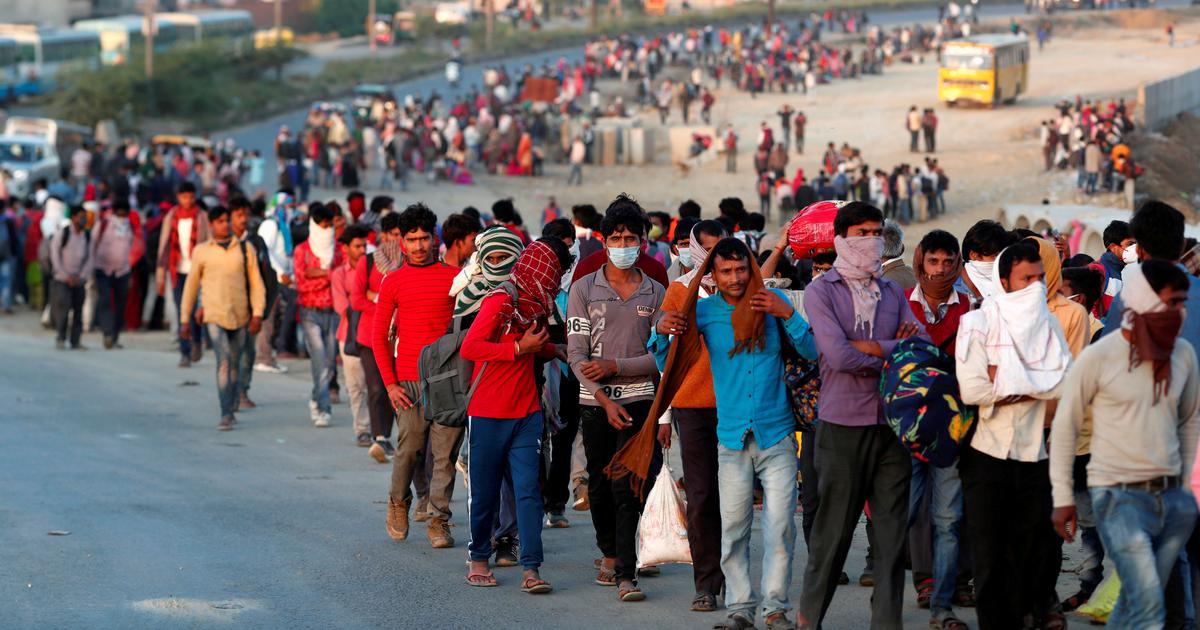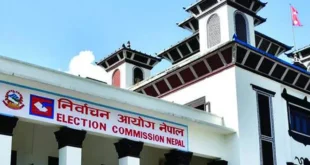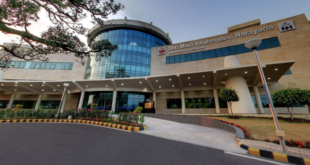Sanjay Singh
 The bustling cities that were built from the sweat, blood and hard work of the migrant workforce and who the migrants had begun to accept as their second homes turned their backs to these same laborers during the coronavirus pandemic.
The bustling cities that were built from the sweat, blood and hard work of the migrant workforce and who the migrants had begun to accept as their second homes turned their backs to these same laborers during the coronavirus pandemic.
Most of these workers were engaged in small and large industries, construction work and domestic help. They were beginning to dream about having a future in the cities however the cities betrayed them so badly that they were forced to return to their native homes.
Most people lived in densely populated hutments with no room for social distancing or even spending the entire day at home as opposed to their reasonably sized ancestral homes in the villages. For the people who managed to live in built houses the rent became unaffordable once the cities were under lockdown and their daily wages stopped.
As advised by the government a number of workers demonstrated courage and stayed put during the first lockdown even though they started running out of money for food and basic necessities with the hope that their needs would be taken care of and life would return to normal soon. These are hard working self-respecting people, who earned their living and were not dependent on anyone’s charity for their well being,

As they started running out of money for basic needs like food they decided to head back home however due to lockdown there were no means of transport and no money to pay for transport. Some contractors released the daily wage workers without paying their dues, others said that the money would eventually be deposited in their accounts and some were paid less than what was owed to them and then there were some who out rightly refused to pay.
They were helpless and were forced to start their journey to native places on foot without food and water. There are numerous stories of people who bought bicycles, motorbikes, got creative with any cart or wheels they could find to help them make this journey with their families.
There are pictures of men, women and kids of all ages walking tens of kilometers with their life’s belongings. There are pregnant women, small children who can barely walk, women with children in their arms all walking away until nightfall where they find some safe place to get some rest until they start again the next day.
Just to get a perspective the distance between Mumbai and Jhansi is more than a 1000 kilometers along the national highway.
Jhansi is the junction that connects states like Maharashtra, Gujarat and Delhi with the interior states of Madhya Pradesh, Uttar Pradesh, Jharkhand, Bihar and West Bengal.
Here are some stories as told by the people returning back from Nagpur on the Border Jhurghat of Jhansi and Lalitpur;
The laborer Neeraj told that he works in a factory in Nagpur that was shut due to lockdown. Since his work was stopped the contractor did not pay him any wages and he had to return to his home in distress.
The laborer Udaybhan said that due to this corona epidemic, the contractors did not give money on a large scale and the people who demanded money were abused. Being helpless he had to return back to his hometown. The contractor asked them to go home and promised to transfer money directly to their bank account.
The laborer Sarvesh said that he had started considering Nagpur city as his permanent home, but in this time of crisis, the people of the city did not help, but inspired him to leave the city.
Nirmala was among the group of laborers walking home. She worked as a domestic help in 5 homes that she considered as family. With the lockdown she was not allowed in the houses to continue her job and was not compensated either. Apart from not paying her, the families she worked for did not even check on her well being.
The laborers of Saharia community of Rampur, Kathwar of Lalitpur district who worked on the brick kilns in Itarsi said that the kilns had been stopped due to the lockdown. The contractor owed them more than twenty rupees each however he told them that he would pay them later and asked them to go back to their villages.
The employers of these workers who are city dwellers are also economically impacted and are not able to demonstrate as much charity as the situation demands. They are reinforcing the stereotype of city dwellers being cold hearted. The market value of human beings and human life has been reduced dramatically and everything is measured in economic terms.
As Mahatma Gandhi said India lives in her seven hundred thousand villages. India is a country of villages in a great need of development hence migration is a big and unique challenge here. The other countries in the world are not facing such challenges.
In this day and age of technology what is sorely lacking is data on these workers. There is not a single organization between the central government, state government, labor unions and the social organizations who can even give an educated guess on the size of the problem. Based on information from the newspapers it is estimated that there are over 5 crore people in transit currently.
This is probably the largest reverse migration in history. Learning from the history of reverse migration from the 1918 Mumbai plague the authorities should have anticipated this situation. Another big challenge is that all communication is happening via television and social media in Hindi or English.
These workers are on the road with no access to any information. A lot of them also cannot read or write or understand the languages of the states they are passing through or any government announcements.
There is a need to really think about the channels of communication to the people on move, the government needs to leverage the social organizations and other public organizations like the police force to disseminate the information. They need to get out of the government offices and carry banners with information and hold rallies to take care of these workers.
They are calling upon the workers now through the trade unions which they should have done that prior to the lockdown. There was a clear lack of communication between the government and the trade unions. The trains and buses organized by the states are just a check mark and are not sufficient for even 30% of the people on the road. This goes back to the fact that there is no data to assess the volume of impact.
At present, many people’s organizations, social and voluntary organizations are working around the clock to give food to these laborers along the way. However with multiple extensions to the lockdown the volunteer efforts are also getting fatigued and running out of funds.
The volunteers were also afraid of getting infected by coronavirus. The food received along the way typically consists of biscuits, rice and daal or chapati and potato vegetable. They have not consumed any green vegetables, fruits, dry fruits or any healthy food in the past 10-12 days while they are expending the energy walking all day. Also they barely got one meal in the day if they got lucky and that too after standing in a line for hours.
Also read : Here, the horse is holding the reins
Also read : 24 migrants die in accident in UP’s Auraiya
Also read : Where Singapore lacked against coronavirus
This has adversely affected their overall health. They don’t have proper footwear and they have blisters on their feet. Their vision is impacted due to lack of sleep for days, healthy nutrition, drinking water and heat. It is unknown how many of these workers are infected by coronavirus and are symptomatic or asymptomatic carriers. The migrating workers do not have masks or sanitizers or access to clean water to wash their hands frequently.
Considering the fourth lockdown is expected to start on May 18th, the workers are really concerned and scared of the impact on them. There is an urgent need to find a way to get all these people home. There is a need to communicate with them, understand the needs and arrange for transportation to get them home safely. Currently they have no faith in any administration and there is a need to really convince them and rebuild their confidence in humanity.
There is a need to build day and night shelters every ten kilometers to allow these people to rest and recover in order to continue their journey. They should be provided with sanitation kits, masks, nutritious food and juices for kids. States have given some relief amount to the villagers however the need is atleast three times the amount per month of lockdown.
Question to think about is what are they heading to. Even if they somehow make it to their villages alive, there is not much to look forward to there. The lack of means of livelihood that made them leave the villages in the first place is still the same. There is no food or money awaiting them there.
They will need financial support, insurance to handle illness due to coronavirus in case they start showing symptoms. They need to be in quarantine once they get home instead of being ostracized for the fear of carrying the virus. Last but not the least there is a need to create livelihood opportunities in the villages. There is an urgent need to develop a database of all the migrant workers by state nationally. I hope someone can translate how the 20 lakh crores issued by the government can help these workers today and keep them alive.
(Writer is National Convener of Jan Jal Jodo Abhiyan)
 Jubilee Post News & Views
Jubilee Post News & Views




